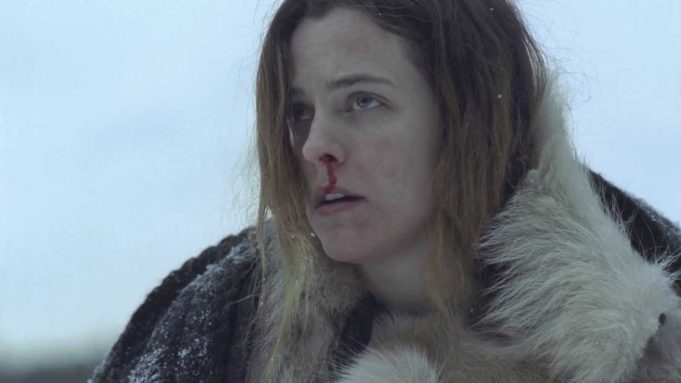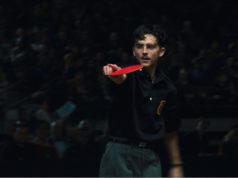Five years ago, the filmmaking team of Severin Fiala and Veronika Franz captured the world’s attention with Goodnight Mommy, a horror movie they made in their native Austria about a mother figure sequestered in a large house with two children. This weekend, their first English-language film The Lodge expands to our theaters with a similar premise, and it does not disappoint, spinning a whole other horrifying story from that setup and making wintry domestic tragedy out of the genre.
The story begins on a blazing hot summer day, with a journalist named Richard (Richard Armitage) curtly telling his wife (Alicia Silverstone) that he wants to finalize their divorce so he can marry Grace (Riley Keough), a young woman who was the subject of one of his books. His wife complies by pulling a gun from her purse and shooting herself in the head. Months later, Richard instructs his kids Aiden and Mia (Jaeden Martell and Lia McHugh) to spend Christmas with Grace at their handsome, secluded hunting lodge. This is a spectacularly bad idea, as the kids make it abundantly clear that they think their mother’s suicide is all Grace’s fault. Later, they find a more solid concern: Grace is the sole survivor of her father’s scary fundamentalist Christian cult whose members committed mass suicide when she was 12. With a blizzard trapping the three of them in the house, they wake up one morning to find all their possessions mysteriously gone — clothes, food, Christmas decorations, Grace’s psychiatric meds, and her dog. Actually, from the moment the little white dog makes an appearance, you know something terrible will befall the animal.
I love these horror films that make you ask which game they’re playing. Are the kids looking to destroy Grace’s mind before she becomes their stepmother? Is Grace the threat, driven to harm the kids by her flashbacks of life at the cult? Is something lurking outside in the wind and snow that’s menacing all of them? Aiden himself raises the possibility that they’ve all died and gone to purgatory. He’s calm when he says this, but he is a lot less calm when he wakes up one morning and finds Grace standing over his bed holding his father’s gun and staring glassy-eyed into empty space. The largely absent Richard has his own disturbing patterns of going in for damaged women. Keough’s resemblance to a younger Silverstone points this up, as if his emotional type manifests itself in a physical type.
It’s fitting that Austrian filmmakers would bring the psychology to a horror movie, but I also like how they bring religion into it, too. Richard has raised his kids as devout Catholics, and you can tell that Grace isn’t feeling the pictures of saints and the crucifixes that have been hung up in the house. Then there’s the scene early on when Mia lashes out at her dad after her mother’s funeral because Catholic theology says that people who kill themselves go to hell. Grace’s father anointed her as a prophet of his religion, and the script leaves open the possibility for that.
Fiala and Franz don’t forget their filmmaking chops either. The lodge itself is full of wood that’s sanded too smooth, like the inside of a dollhouse. (A framing device with the wife arranging a dollhouse shaped like the lodge makes me think this whole movie might be an elaborate revenge fantasy of hers.) The directors’ sense of composition contributes to the horror in a late scene as the kids cower in the attic while Grace comes up the ladder, frostbitten and blood-spattered, telling them softly that there’s nothing to be scared of. Keough, whose grandfather Elvis Presley also acted in some films, does fine work in scenes such as that one and the final one, where she sings “Nearer, My God, to Thee” with the children before the ultimate catastrophe. That ending shows us that Fiala and Franz are filmmakers who don’t need monsters or supernatural beings. They know that the demons running loose in the human heart and especially the brain are enough to create terror of the soul.
Starring Riley Keough, Jaeden Martell, and Lia McHugh. Directed by Severin Fiala and Veronika Franz. Written by Sergio Casci, Severin Fiala, and Veronika Franz. Rated R.











